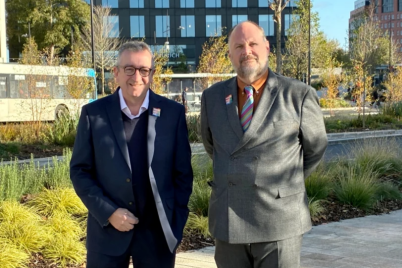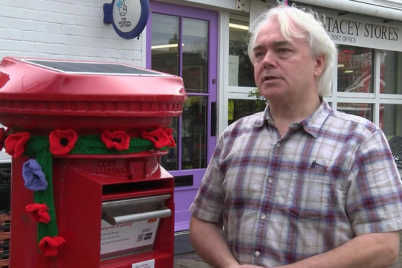A man in Tewkesbury has been convicted on six counts of fraud for doing something that, while ostensibly wrong, may have exposed something fundamental about how we view work.
Bryn Howells, 66, was sentenced to jail for three years because he defrauded Tewkesbury Borough Council, South Gloucestershire Council and Publica Group out of a collective £236,000.
He did this by working the roles of strategic housing and enabling officer, senior development surveyor, and valuer and estates surveyor, all at once.
This was empowered by false timesheets and taking advantage of a seemingly more hands-off management style that was supposed to allow for employee freedom to work effectively, but in this case was abused to make extra cash.
There is no question that what Mr Howells did was wrong as a result of the deception involved. In the sentencing process, Judge Malcom Gibbney said “You did not do in any given week, three lots or four lots of 37 hours.”
Mr Howells attempts to defend himself by claims of things like “unintentional oversight” and claims that his timesheets were hours that he made himself “available” for work were entirely dismissed by the judge.
“You have effectively put your head in the sand as far as this is concerned when it comes to accepting your actions were dishonest.” Said Judge Gibbney.
However, the judge was not entirely condemnatory of Mr Howells work ethic and the work he did itself, which points us towards an important question.
Judge Gibbney said, “It’s clear that when you did work, the work was good. You are an experienced man in your profession. You are a man with a passion for your job.
“You took the view this was an opportunity to make hay while the sun shined and you could earn significant sums of money doing work for local authorities.”
Mr Howells also insisted that none of the people he worked for at the time lost out, since all the work he was assigned was completed on time and to sufficient quality. A fact that is reinforced by how the deception was only uncovered by payroll analysis following work by the Counter Fraud and Enforcement Unit as part of the National Fraud Initiative.
The central argument made by Tewkesbury council as to the fraud is that Mr Howells would never have been hired in the first place had they known that he was planning to stay in full time employment elsewhere.
However, as to the quality of his work for Tewkesbury council itself, no aspersions have been cast and no failures have been reported. Southern Gazette has reached out to the council for further comment on this point, but so far none has been forthcoming.
The only broad statements on the issue have come from Simon Dix, Executive Director of Resources at Tewkesbury Borough Council, who said: “We welcome the conclusion of this case and the sentencing handed down today. Mr Howells’ actions represented a serious breach of trust and a misuse of public funds. His conduct fell far short of the standards expected of public servants and undermined the integrity of the organisations he served.
“As soon as concerns were raised, we acted swiftly and worked closely with the Counter Fraud and Enforcement Unit to investigate the matter thoroughly. We are committed to recovering the public money lost through this fraud and have reviewed our internal procedures to strengthen safeguards against similar incidents.
“We remain resolute in our zero-tolerance approach to fraud and will continue to uphold the highest standards of integrity and accountability in public service.”
What is notable here is a total absence of comment on the quality of Mr Howells’ work
This entire incident raises two vital questions – what were these organisations doing, and what exactly did Mr Howells do wrong?
If all of the people Mr Howells worked for didn’t notice that they weren’t getting a full days work out of him, how was it economical to employ him like this?
How much time and money was being wasted in all these cases? Were their expectations for their other employees too low? Was the managerial style too lax?
If Mr Howells can get away with this, maybe others could too.
A hands off managerial style has value, in allowing employees to be relaxed enough to get things done at their own pace in an efficient way, but perhaps too much so in this case.
The second question, was Mr Howell’s big crime just the fact that he lied?
Does that all really matter though? He got all his work done, and no one lost out in terms of missed work or lapsed duties.
There are many tasks and jobs where simply doing the work for a longer time offers no real increased benefit or improvement to the services offered. Sometimes the work is simply finished, and the role provided to the standard required. So if that was the case here, should Mr Howells and others like him really be unable to do multiple jobs at the same time.
While the deception involved obviously makes this a crime, the fact remains that Mr Howells was able to do all his work to the standards expected of him. If that were possible, should his employers really expect exclusivity?
At the end of the day, everyone of us only has twenty four hours in a day to hand. That is always fixed and there is no way around that.
Yet the prices of things change and rise for reasons far beyond the control of individuals. This is not just luxuries and niceties. This is prices of essential things like housing and shelter and other such issues.
Poverty may well not have been Mr Howell’s problem, but if someone working a single full time job is unable to earn enough, and wants to take on additional simultaneous work without compromising their overall performance, should we be really looking to stop them?
The vast majority of people in the western world, around 70%, receive their income through one source of employment. Yet many people in this situation still do not earn enough to live.
Action For Children reports there are at least 300,000 families in poverty in the UK where one of the parents is in full time employment. Since there are no more hours to work in the day, and companies are seemingly unwilling to push past minimum wage laws in many cases, perhaps there needs to be an attitude shift around multiple jobs?
Perhaps the case of Mr Howells demonstrates that at the end of the day it should be less a question of “how long did you work” and more a matter of “has the role been done satisfactorily?”
Obviously there are many roles where such things are not possible. Heart surgeons cannot be performing bypasses with one hand and typing legal advice notes with the other. Yet perhaps the very single-focused nature of these roles should re-contextualise their value, while employers in other roles should maybe be more open when people perform in multiple roles in other jobs.
Mr Howells was definitely dishonest, but his actions should refocus our minds.
We need to remember that while time might be fixed, effort and expense are elastic. Our morals, laws, and the way we run our economy should reflect that.















